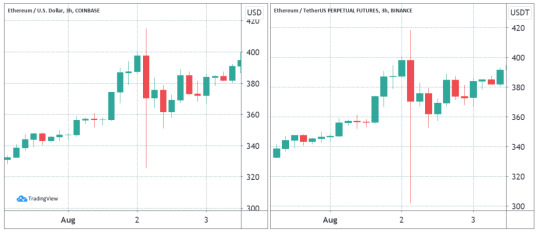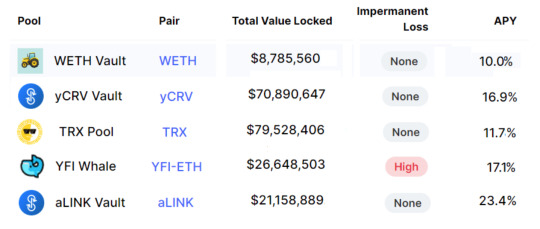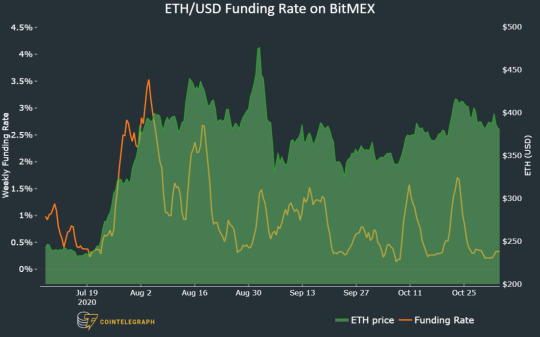#wicked posts incoming…beware
Explore tagged Tumblr posts
Text
3 factors to consider before trading crypto perpetual futures contracts
https://ift.tt/3lf81jc
3 factors to consider before trading crypto perpetual futures contracts
As tempting as it can be to buy altcoins using perpetual futures, there are a few hidden traps that one should monitor closely.
Over the past few years, numerous exchanges began to offer altcoin futures quoted in Tether (USDT) and stablecoin pairs, which eventually became the standard. This change is more convenient for most traders but still presents some serious issues for those willing to keep long positions open for more than a couple of weeks.
Before opening any trade at an exchange offering perpetual futures, traders should be aware that stronger wicks can run stop losses, investors lose the ability to stake their altcoins for lucrative yields, and the variable funding rate can significantly increase the costs of carrying a trade.
Leverage leads to stronger wicks
Regardless of how liquid a market is, leverage will result in stronger wicks. Even though these moves usually don’t lead to forced liquidation, it might run an investors’ stops.
Therefore, the possibility of errant wicks are the main reason traders should avoid carrying futures positions for more extended periods.
Futures liquidation engines use a price index composed of multiple spot (regular) exchanges to avoid price manipulation. Thus, the system will only close positions with insufficient margin once an index reaches its stops.

Ether Coinbase and Binance perpetual futures. Source: Tradingview
Take notice how ETH had a $326 low on Coinbase, while simultaneously Binance futures faced a $302 low. This change might seem small, but this certainly triggered traders’ stop orders.
There’s a way to avoid such issues, simply by setting one’s stop orders trigger to Mark Price (Index) instead of Last Price.

BTC futures contract trigger price selection. Source: Binance
Making this simple change will avoid getting liquidated if futures contracts monetarily decouple from its index. The big issue is that not every exchange offers this possibility.
Staking and liquidity mining may offer a better yield
Buying altcoins using futures does not allow one to use them for staking or lending. For investors willing to carry a position for a longer-term, this is another factor to consider.
There are numerous platforms offering staking and lending services, including the top centralized exchanges. Some of the altcoins offering 30-day contract annual percentage yields (APY) that can range from 7% to 18% are Polkadot (DOT), Tron (TRX), Cosmos (ATOM), and Cardano (ADA).
Decentralized (DeFi) mining pools are another way to generate income by holding altcoins. Users should beware of this sector’s inherent risks, especially those pools with impairment loss occurring between two different cryptocurrencies.

Current DeFi yield returns. Source: CoinMarketCap
Thus, by opting for perpetual futures, one will not be able to partake in staking and yield farming. It might not impact the decision for those betting on short-term price swings, but it weighs more as the weeks go by.
Beware of fluctuating funding rates
Perpetual contracts, also known as inverse swaps, have an embedded rate that usually charged every eight hours. Funding rates ensure there are no exchange risk imbalances. Even though both buyers and sellers open interest is matched at all times, leverage can vary.
When buyers (longs) are the ones demanding more leverage, the funding rate goes positive. Therefore, those buyers will be the ones paying up the fees. This issue holds especially true under bull run periods, when usually there’s more demand for longs.

BitMEX ETH/USD perpetual contract funding rate. Source: Digital Assets Data
The above chart shows the late July bull run and it is clear to see that as Ether (ETH) hiked from $230 to $380, so did its perpetual funding rate. After averaging 1.8% for three weeks, this negatively impacted buyers’ gains.
Again, it might not be harmful for those carrying short-term positions, but it adds up over the months.
To avoid this shortcoming, one might opt for margin trading instead of futures contracts. Borrowing will usually cost between 0.5 and 1.4% per month, while maximum leverage ranges from 3x to 10x.
Similar to the perpetual futures, investors also need to deposit margin to access such markets.
It is worth noting that some exchanges will let users manually pick rates and set periods for borrowing. This method is far superior as it avoids surprises that will naturally occur during heavy buying activity.
While perpetual futures trading is an excellent tool, it comes with shortcomings. Among those, stronger wicks running stop losses, the inability to stake, and the variable funding rate.
The views and opinions expressed here are solely those of the author and do not necessarily reflect the views of Cointelegraph. Every investment and trading move involves risk. You should conduct your own research when making a decision.
https://ift.tt/3p6RFeF Bitcoin News 3 factors to consider before trading crypto perpetual futures contracts
Wanna Win Some Free Crypto?
This is our favorite crypto casino... Check it out and get a free sign up bonus and daily crypto rewards!

The post 3 factors to consider before trading crypto perpetual futures contracts appeared first on ESA Token.
from WordPress https://ift.tt/3kfz9gl via IFTTT https://ift.tt/3oqtis8 https://ift.tt/3dTdjOi
0 notes
Text
[Eugene Volokh] ‘Beware of the Internet and Facebook. You might find yourselves paying damages to someone.’
Last week’s panel opinion in Breen v. Holmes (La. Ct. App. Dec. 7, 2017) is a pretty standard application of libel law principles (I quote it at length below). Some online commenters were arguing that a woman (Kacie Breen) who shot and killed her husband should have been charged with murder, despite her claims of self-defense. The court held that, in context, the statements were opinion evaluating the published evidence, and thus couldn’t form the basis of a defamation claim. But, to my surprise, one of the judges, Judge John Pettigrew, added a short concurrence, saying in part:
I must express my concerns about the defendants’ statements. I suggest the statements were loose, gossipy, and reflected a lynch-mob mentality. The citizens of Louisiana should beware of the Internet and Facebook. You might find yourselves paying damages to someone.
That seems to me quite odd, especially since the judge joined a decision that concluded that the “loose,” “gossipy” and allegedly lynch-mobby statements were legally nonactionable opinion. If the judge is warning people against expressing their opinions, that strikes me as quite troubling — and if he’s warning them against making false factual assertions (which would indeed be libelous), that warning seems misplaced here (especially absent some clearer explanation of what he’s warning about).
In any case, here’s the quick summary of the factual background:
On March 1, 2015, Kacie Magee Breen shot and killed her husband, Wayne Breen, a St. Tammany Parish physician. She maintains she was defending herself from an attack and reasonably believed she was in imminent danger of death or great bodily harm. Following the shooting, local media attention focused on Dr. Breen’s death, the St. Tammany Parish coroner’s classification of the death as a homicide, the criminal investigation that resulted in Breen not being arrested, charged, indicted, or prosecuted for her husband’s death, and Breen’s actions related to Dr. Breen’s estate.
In January 2016, Breen filed suit alleging the defendants defamed her in internet posts commenting about events before, at the time of, and after Dr. Breen’s death. She claimed all the statements about her, including those calling her a murderer, were false and caused her shame, humiliation, discomfort, loss of reputation, public ridicule, loss of income, and mental anguish.
And here’s the court’s legal analysis:
[“]In determining whether an expression is a statement of fact or opinion under the common law, words must be read in their context. Words which, taken by themselves, would appear to be a positive allegation of fact, may be shown by the context to be a mere expression of opinion or argumentative influence…. In order for a statement to be defended as fair comment it must be recognizable by the ordinary reasonable person as opinion and not as a statement of fact.[“] …
The claims against Arndt and Maestri are premised on single internet posts attributed to each of them. Neither post is dated, but the record establishes they were made before Breen filed suit on January 6, 2016, which was less than one year after Dr. Breen’s death on March 1, 2015. The record additionally establishes that during that year, the media focused continuous attention on the shooting, the classification of the death as a homicide by the coroner, the claim that Breen acted in self-defense during a violent altercation, the legal “battle” between Breen and Dr. Breen’s heirs over his estate, the removal by Breen of items from Dr. Breen’s office, the criminal investigation into Dr. Breen’s death, protests expected at the courthouse related to these matters, the decision not to arrest Breen, court filings recounting the self-defense claim, a civil wrongful death suit against Breen, and this defamation suit.
The allegedly defamatory statement attributed to Arndt is:
I guarantee that she had this plot in the makings for sometime. There is no doubt that she staged all the abuse charges against him knowing she could use it later. She is a wicked person.
Arndt averred in her affidavit that she had known Dr. Breen for twenty-one years, believed he saved the lives of her daughter and grandchild, and was sad about his death. She joined a Facebook group called “Rest In Peace Dr. Breen,” for people grieving Dr. Breen’s death. She recalled reading that the coroner classified Dr. Breen’s death as a homicide and expressed frustration with the decision not to arrest Breen. Arndt stated she joined what she believed was a closed Facebook group called “Justice For Dr. Breen,” for people angry and upset that Breen was not arrested and who wanted to discuss whether Breen should be arrested and prosecuted. Arndt averred that any comment she posted was strictly her opinion that Breen should be arrested.
The allegedly defamatory statement attributed to Maestri is:
The more I learn about this tragedy, the more I am convinced that Dr. Breen’s death was premeditated murder and not manslaughter in a moment of passion. How, in God’s name, has this woman avoided arrest? ? ? My most sincere sympathy to the Breen children that they must suffer further as they grieve the loss of their father.
Maestri averred in her affidavit that she had known Dr. Breen for two years, and considered him a source of strength and support for her family. She stated she posted her condolences to his family on the funeral home’s grief page, where she also read about the closed Facebook group called “Rest In Peace Dr. Breen,” for people grieving the death of Dr. Breen. Maestri stated she believed the purpose of the group was to read about and try to understand what happened to Dr. Breen.
Maestri also stated she joined the Facebook group called “Justice For Dr. Breen,” which helped her understand the loss of Dr. Breen. She indicated she is still upset Breen was not arrested and outraged by what she believes is an injustice. She explained that any comment she posted was her opinion about Dr. Breen’s death and whether Breen should be arrested and prosecuted….
In making their statements, neither Arndt nor Maestri represented that they are a legal authority on the distinctions between the grades of criminal homicide and the legal definition of justifiable homicide. Nor does either statement imply that the speaker is privy to undisclosed facts. Rather, the evidence establishes that the statements were made against a backdrop of continuous media reports fixing the public’s attention on these issues, specifically whether Breen should be criminally prosecuted for killing her husband, based on the facts being reported.
When considered in context, a reasonable person considering Arndt’s and Maestri’s statements in the particular forums in which they were made would not believe them to be anything other than the subjective opinions of Arndt and Maestri expressing disagreement with Breen’s claim that she acted in self-defense and their criticism of the decision not to criminally prosecute her. Neither statement is an actionable defamatory statement. Rather, both are constitutionally protected statements of opinion….
0 notes
Text
‘Beware of the Internet and Facebook. You might find yourselves paying damages to someone.’
Last week’s panel opinion in Breen v. Holmes (La. Ct. App. Dec. 7, 2017) is a pretty standard application of libel law principles (I quote it at length below). Some online commenters were arguing that a woman (Kacie Breen) who shot and killed her husband should have been charged with murder, despite her claims of self-defense. The court held that, in context, the statements were opinion evaluating the published evidence, and thus couldn’t form the basis of a defamation claim. But, to my surprise, one of the judges, Judge John Pettigrew, added a short concurrence, saying in part:
I must express my concerns about the defendants’ statements. I suggest the statements were loose, gossipy, and reflected a lynch-mob mentality. The citizens of Louisiana should beware of the Internet and Facebook. You might find yourselves paying damages to someone.
That seems to me quite odd, especially since the judge joined a decision that concluded that the “loose,” “gossipy” and allegedly lynch-mobby statements were legally nonactionable opinion. If the judge is warning people against expressing their opinions, that strikes me as quite troubling — and if he’s warning them against making false factual assertions (which would indeed be libelous), that warning seems misplaced here (especially absent some clearer explanation of what he’s warning about).
In any case, here’s the quick summary of the factual background:
On March 1, 2015, Kacie Magee Breen shot and killed her husband, Wayne Breen, a St. Tammany Parish physician. She maintains she was defending herself from an attack and reasonably believed she was in imminent danger of death or great bodily harm. Following the shooting, local media attention focused on Dr. Breen’s death, the St. Tammany Parish coroner’s classification of the death as a homicide, the criminal investigation that resulted in Breen not being arrested, charged, indicted, or prosecuted for her husband’s death, and Breen’s actions related to Dr. Breen’s estate.
In January 2016, Breen filed suit alleging the defendants defamed her in internet posts commenting about events before, at the time of, and after Dr. Breen’s death. She claimed all the statements about her, including those calling her a murderer, were false and caused her shame, humiliation, discomfort, loss of reputation, public ridicule, loss of income, and mental anguish.
And here’s the court’s legal analysis:
[“]In determining whether an expression is a statement of fact or opinion under the common law, words must be read in their context. Words which, taken by themselves, would appear to be a positive allegation of fact, may be shown by the context to be a mere expression of opinion or argumentative influence…. In order for a statement to be defended as fair comment it must be recognizable by the ordinary reasonable person as opinion and not as a statement of fact.[“] …
The claims against Arndt and Maestri are premised on single internet posts attributed to each of them. Neither post is dated, but the record establishes they were made before Breen filed suit on January 6, 2016, which was less than one year after Dr. Breen’s death on March 1, 2015. The record additionally establishes that during that year, the media focused continuous attention on the shooting, the classification of the death as a homicide by the coroner, the claim that Breen acted in self-defense during a violent altercation, the legal “battle” between Breen and Dr. Breen’s heirs over his estate, the removal by Breen of items from Dr. Breen’s office, the criminal investigation into Dr. Breen’s death, protests expected at the courthouse related to these matters, the decision not to arrest Breen, court filings recounting the self-defense claim, a civil wrongful death suit against Breen, and this defamation suit.
The allegedly defamatory statement attributed to Arndt is:
I guarantee that she had this plot in the makings for sometime. There is no doubt that she staged all the abuse charges against him knowing she could use it later. She is a wicked person.
Arndt averred in her affidavit that she had known Dr. Breen for twenty-one years, believed he saved the lives of her daughter and grandchild, and was sad about his death. She joined a Facebook group called “Rest In Peace Dr. Breen,” for people grieving Dr. Breen’s death. She recalled reading that the coroner classified Dr. Breen’s death as a homicide and expressed frustration with the decision not to arrest Breen. Arndt stated she joined what she believed was a closed Facebook group called “Justice For Dr. Breen,” for people angry and upset that Breen was not arrested and who wanted to discuss whether Breen should be arrested and prosecuted. Arndt averred that any comment she posted was strictly her opinion that Breen should be arrested.
The allegedly defamatory statement attributed to Maestri is:
The more I learn about this tragedy, the more I am convinced that Dr. Breen’s death was premeditated murder and not manslaughter in a moment of passion. How, in God’s name, has this woman avoided arrest? ? ? My most sincere sympathy to the Breen children that they must suffer further as they grieve the loss of their father.
Maestri averred in her affidavit that she had known Dr. Breen for two years, and considered him a source of strength and support for her family. She stated she posted her condolences to his family on the funeral home’s grief page, where she also read about the closed Facebook group called “Rest In Peace Dr. Breen,” for people grieving the death of Dr. Breen. Maestri stated she believed the purpose of the group was to read about and try to understand what happened to Dr. Breen.
Maestri also stated she joined the Facebook group called “Justice For Dr. Breen,” which helped her understand the loss of Dr. Breen. She indicated she is still upset Breen was not arrested and outraged by what she believes is an injustice. She explained that any comment she posted was her opinion about Dr. Breen’s death and whether Breen should be arrested and prosecuted….
In making their statements, neither Arndt nor Maestri represented that they are a legal authority on the distinctions between the grades of criminal homicide and the legal definition of justifiable homicide. Nor does either statement imply that the speaker is privy to undisclosed facts. Rather, the evidence establishes that the statements were made against a backdrop of continuous media reports fixing the public’s attention on these issues, specifically whether Breen should be criminally prosecuted for killing her husband, based on the facts being reported.
When considered in context, a reasonable person considering Arndt’s and Maestri’s statements in the particular forums in which they were made would not believe them to be anything other than the subjective opinions of Arndt and Maestri expressing disagreement with Breen’s claim that she acted in self-defense and their criticism of the decision not to criminally prosecute her. Neither statement is an actionable defamatory statement. Rather, both are constitutionally protected statements of opinion….
Originally Found On: http://www.washingtonpost.com/news/volokh-conspiracy/wp/2017/12/12/beware-of-the-internet-and-facebook-you-might-find-yourselves-paying-damages-to-someone/
0 notes
Text
‘Beware of the Internet and Facebook. You might find yourselves paying damages to someone.’
Last week’s panel opinion in Breen v. Holmes (La. Ct. App. Dec. 7, 2017) is a pretty standard application of libel law principles (I quote it at length below). Some online commenters were arguing that a woman (Kacie Breen) who shot and killed her husband should have been charged with murder, despite her claims of self-defense. The court held that, in context, the statements were opinion evaluating the published evidence, and thus couldn’t form the basis of a defamation claim. But, to my surprise, one of the judges, Judge John Pettigrew, added a short concurrence, saying in part:
I must express my concerns about the defendants’ statements. I suggest the statements were loose, gossipy, and reflected a lynch-mob mentality. The citizens of Louisiana should beware of the Internet and Facebook. You might find yourselves paying damages to someone.
That seems to me quite odd, especially since the judge joined a decision that concluded that the “loose,” “gossipy” and allegedly lynch-mobby statements were legally nonactionable opinion. If the judge is warning people against expressing their opinions, that strikes me as quite troubling — and if he’s warning them against making false factual assertions (which would indeed be libelous), that warning seems misplaced here (especially absent some clearer explanation of what he’s warning about).
In any case, here’s the quick summary of the factual background:
On March 1, 2015, Kacie Magee Breen shot and killed her husband, Wayne Breen, a St. Tammany Parish physician. She maintains she was defending herself from an attack and reasonably believed she was in imminent danger of death or great bodily harm. Following the shooting, local media attention focused on Dr. Breen’s death, the St. Tammany Parish coroner’s classification of the death as a homicide, the criminal investigation that resulted in Breen not being arrested, charged, indicted, or prosecuted for her husband’s death, and Breen’s actions related to Dr. Breen’s estate.
In January 2016, Breen filed suit alleging the defendants defamed her in internet posts commenting about events before, at the time of, and after Dr. Breen’s death. She claimed all the statements about her, including those calling her a murderer, were false and caused her shame, humiliation, discomfort, loss of reputation, public ridicule, loss of income, and mental anguish.
And here’s the court’s legal analysis:
[“]In determining whether an expression is a statement of fact or opinion under the common law, words must be read in their context. Words which, taken by themselves, would appear to be a positive allegation of fact, may be shown by the context to be a mere expression of opinion or argumentative influence…. In order for a statement to be defended as fair comment it must be recognizable by the ordinary reasonable person as opinion and not as a statement of fact.[“] …
The claims against Arndt and Maestri are premised on single internet posts attributed to each of them. Neither post is dated, but the record establishes they were made before Breen filed suit on January 6, 2016, which was less than one year after Dr. Breen’s death on March 1, 2015. The record additionally establishes that during that year, the media focused continuous attention on the shooting, the classification of the death as a homicide by the coroner, the claim that Breen acted in self-defense during a violent altercation, the legal “battle” between Breen and Dr. Breen’s heirs over his estate, the removal by Breen of items from Dr. Breen’s office, the criminal investigation into Dr. Breen’s death, protests expected at the courthouse related to these matters, the decision not to arrest Breen, court filings recounting the self-defense claim, a civil wrongful death suit against Breen, and this defamation suit.
The allegedly defamatory statement attributed to Arndt is:
I guarantee that she had this plot in the makings for sometime. There is no doubt that she staged all the abuse charges against him knowing she could use it later. She is a wicked person.
Arndt averred in her affidavit that she had known Dr. Breen for twenty-one years, believed he saved the lives of her daughter and grandchild, and was sad about his death. She joined a Facebook group called “Rest In Peace Dr. Breen,” for people grieving Dr. Breen’s death. She recalled reading that the coroner classified Dr. Breen’s death as a homicide and expressed frustration with the decision not to arrest Breen. Arndt stated she joined what she believed was a closed Facebook group called “Justice For Dr. Breen,” for people angry and upset that Breen was not arrested and who wanted to discuss whether Breen should be arrested and prosecuted. Arndt averred that any comment she posted was strictly her opinion that Breen should be arrested.
The allegedly defamatory statement attributed to Maestri is:
The more I learn about this tragedy, the more I am convinced that Dr. Breen’s death was premeditated murder and not manslaughter in a moment of passion. How, in God’s name, has this woman avoided arrest? ? ? My most sincere sympathy to the Breen children that they must suffer further as they grieve the loss of their father.
Maestri averred in her affidavit that she had known Dr. Breen for two years, and considered him a source of strength and support for her family. She stated she posted her condolences to his family on the funeral home’s grief page, where she also read about the closed Facebook group called “Rest In Peace Dr. Breen,” for people grieving the death of Dr. Breen. Maestri stated she believed the purpose of the group was to read about and try to understand what happened to Dr. Breen.
Maestri also stated she joined the Facebook group called “Justice For Dr. Breen,” which helped her understand the loss of Dr. Breen. She indicated she is still upset Breen was not arrested and outraged by what she believes is an injustice. She explained that any comment she posted was her opinion about Dr. Breen’s death and whether Breen should be arrested and prosecuted….
In making their statements, neither Arndt nor Maestri represented that they are a legal authority on the distinctions between the grades of criminal homicide and the legal definition of justifiable homicide. Nor does either statement imply that the speaker is privy to undisclosed facts. Rather, the evidence establishes that the statements were made against a backdrop of continuous media reports fixing the public’s attention on these issues, specifically whether Breen should be criminally prosecuted for killing her husband, based on the facts being reported.
When considered in context, a reasonable person considering Arndt’s and Maestri’s statements in the particular forums in which they were made would not believe them to be anything other than the subjective opinions of Arndt and Maestri expressing disagreement with Breen’s claim that she acted in self-defense and their criticism of the decision not to criminally prosecute her. Neither statement is an actionable defamatory statement. Rather, both are constitutionally protected statements of opinion….
Originally Found On: http://www.washingtonpost.com/news/volokh-conspiracy/wp/2017/12/12/beware-of-the-internet-and-facebook-you-might-find-yourselves-paying-damages-to-someone/
0 notes